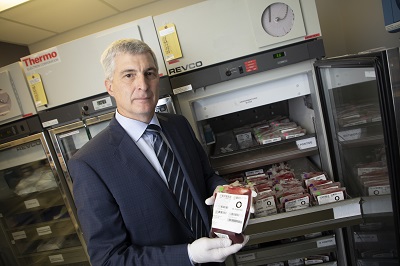Sex of blood donor has no effect on recipient survival
 "Some observational studies had suggested female donor blood might be linked with a higher risk of death among recipients compared to male donor blood, but our clinical trial found that isn't the case."- Dr. Dean Fergusson A large clinical trial of more than 8,700 patients published in the New England Journal of Medicine concluded that the sex of a donor has no effect on the survival of recipients of red blood cell transfusions.
"Some observational studies had suggested female donor blood might be linked with a higher risk of death among recipients compared to male donor blood, but our clinical trial found that isn't the case."- Dr. Dean Fergusson A large clinical trial of more than 8,700 patients published in the New England Journal of Medicine concluded that the sex of a donor has no effect on the survival of recipients of red blood cell transfusions.
"Some observational studies had suggested female donor blood might be linked with a higher risk of death among recipients compared to male donor blood, but our clinical trial found that isn't the case," said co-lead author Dr. Dean Fergusson, a senior scientist at The Ottawa Hospital, Director of the hospital's Clinical Epidemiology Program and professor at the University of Ottawa.
The possible impact of the sex of a blood donor on recipient survival has been an unanswered question in transfusion medicine since 2015, when the American National Heart, Lung and Blood Institute identified it as a research priority. Some evidence suggested that sex-related differences such as hormone levels in male and female blood might affect recipient survival, but the results of observational studies have been conflicting. "By embedding this trial in real-world practice and using practical methods, we answered this question for a fraction of what a trial would normally cost."-Dr. Michaël Chassé
"By embedding this trial in real-world practice and using practical methods, we answered this question for a fraction of what a trial would normally cost."-Dr. Michaël Chassé
"To answer this question definitively we needed a large, randomized clinical trial, but those studies are incredibly expensive," said Dr. Michaël Chassé, co-lead author of the study and intensivist at Centre hospitalier de l'Université de Montréal and associate professor at Université de Montréal. "By embedding this trial in real-world practice and using practical methods, we answered this question for a fraction of what a trial would normally cost."
The research team estimates that using typical trial methods, this trial would have cost $9 million, but with their innovative approach, it only cost $300,000. The approach involved enrolling every adult patient at The Ottawa Hospital who might need a transfusion, randomizing them to receive male or female blood, and then collecting data from existing hospital databases and provincial registries. As male and female blood were considered equivalent treatments, patients did not need to provide written consent to join the trial, but were given the option to opt out after the first transfusion. With this pragmatic approach, the team was able to enroll 8,719 participants into their double-blind, randomized trial in just over two years.
The study did not include patients without an Ontario Health Insurance Plan number, those who were massively bleeding and needed blood right away, and those with a complex antibody profile which made blood unit matching difficult.
Study participants were randomly assigned to receive either male or female donor blood at all visits to The Ottawa Hospital during the study period. Eighty per cent of patients received their first transfusion while they were an inpatient, and 42 per cent of those received it during surgery.
Patient characteristics, laboratory and clinical data, and blood bank data were obtained from The Ottawa Hospital Data Warehouse. Blood donor data from Canadian Blood Services was linked with hospital data and health administrative data at ICES.
The study found no statistically significant differences in overall survival between recipients of male donor blood and recipients of female donor blood.
"Blood is the most common life-saving treatment given in hospital," said Dr. Jason Acker, senior scientist at Canadian Blood Services. "As a blood provider, we were happy to help answer this very important question in transfusion medicine. We hope the findings encourage all eligible donors to continue to donate."
Full reference: The effect of donor sex on recipient mortality in transfusion. Michaël Chassé, Dean A Fergusson, Alan Tinmouth, Jason P Acker, Iris Perelman, Angie Tuttle, Shane English, Steven Hawken, Alan J Forster, Nadine Shehata, Kednapa Thavorn, Kumanan Wilson, Nancy Cober, Heather Maddison, Melanie Tokessy. New England Journal of Medicine. April 12, 2023.
Funding: This study was funded by the Canadian Institutes of Health Research. All research at The Ottawa Hospital is also enabled by generous donors to The Ottawa Hospital Foundation.
Core resources: Ottawa Methods Centre, The Ottawa Hospital Data Warehouse, ICES
About The Ottawa Hospital
The Ottawa Hospital is one of Canada's top learning and research hospitals, where excellent care is inspired by research and driven by compassion. As the third-largest employer in Ottawa, our support staff, researchers, nurses, physicians, and volunteers never stop seeking solutions to the most complex health-care challenges. Our multi-campus hospital, affiliated with the University of Ottawa, attracts some of the most influential scientific minds from around the world. Backed by generous support from the community, we are committed to providing the world-class, compassionate care we would want for our loved ones. www.ohri.ca
About the University of Ottawa
The University of Ottawa is home to over 54,000 students, faculty and staff, who live, work and study in both French and English. Our campus is a crossroads of cultures and ideas, where bold minds come together to inspire game-changing ideas. We are one of Canada's top 10 research universities--our professors and researchers explore new approaches to today's challenges. One of a handful of Canadian universities ranked among the top 200 in the world, we attract exceptional thinkers and welcome diverse perspectives from across the globe. www.uottawa.ca
About the CRCHUM
The University of Montreal Hospital Research Centre (CRCHUM) is one of North America's leading hospital research centres. It strives to improve adult health through a research continuum covering such disciplines as the fundamental sciences, clinical research and public health. Over 2,300 people work at the CRCHUM, including more than 500 researchers and more than 520 graduate students. chumontreal.qc.ca/crchum @CRCHUM
About Université de Montréal
Deeply rooted in Montreal and dedicated to its international mission, Université de Montréal is one of the top universities in the French-speaking world. Founded in 1878, Université de Montréal today has 13 faculties and schools, and together with its two affiliated schools, HEC Montréal and Polytechnique Montréal, constitutes the largest centre of higher education and research in Québec and one of the major centres in North America. It brings together 2,400 professors and researchers and has more than 67,000 students. umontreal.ca
ICES is an independent, non-profit research institute that uses population-based health information to produce knowledge on a broad range of health care issues. Our unbiased evidence provides measures of health system performance, a clearer understanding of the shifting health care needs of Ontarians, and a stimulus for discussion of practical solutions to optimize scarce resources. ICES knowledge is highly regarded in Canada and abroad, and is widely used by government, hospitals, planners, and practitioners to make decisions about care delivery and to develop policy. In October 2018, the institute formerly known as the Institute for Clinical Evaluative Sciences formally adopted the initialism ICES as its official name. For the latest ICES news, follow us on Twitter: @ICESOntario
Media Contact
Amelia Buchanan
Senior Communication Specialist
Ottawa Hospital Research Institute
Cell: 613-297-8315
ambuchanan@ohri.ca
Learn more about:
The Ottawa Hospital is a leading academic health, research and learning hospital proudly affiliated with the University of Ottawa and supported by The Ottawa Hospital Foundation.


